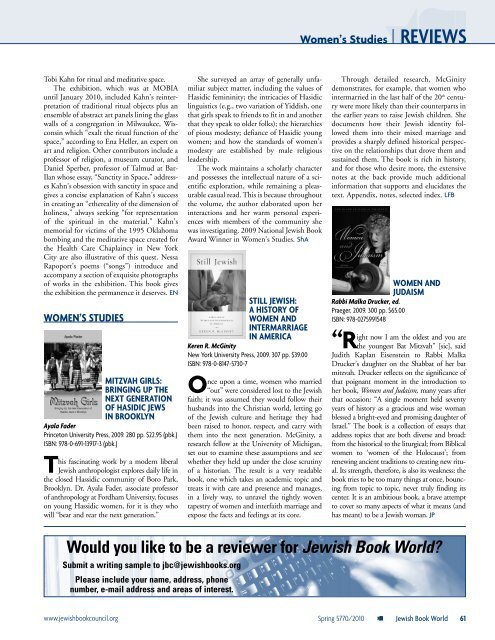reviews - Jewish Book Council
reviews - Jewish Book Council
reviews - Jewish Book Council
Create successful ePaper yourself
Turn your PDF publications into a flip-book with our unique Google optimized e-Paper software.
Tobi Kahn for ritual and meditative space.<br />
The exhibition, which was at MOBIA<br />
until January 2010, included Kahn’s reinterpretation<br />
of traditional ritual objects plus an<br />
ensemble of abstract art panels lining the glass<br />
walls of a congregation in Milwaukee, Wisconsin<br />
which “exalt the ritual function of the<br />
space,” according to Ena Heller, an expert on<br />
art and religion. Other contributors include a<br />
professor of religion, a museum curator, and<br />
Daniel Sperber, professor of Talmud at Bar-<br />
Ilan whose essay, “Sanctity in Space,” addresses<br />
Kahn’s obsession with sanctity in space and<br />
gives a concise explanation of Kahn’s success<br />
in creating an “ethereality of the dimension of<br />
holiness,” always seeking “for representation<br />
of the spiritual in the material.” Kahn’s<br />
memorial for victims of the 1995 Oklahoma<br />
bombing and the meditative space created for<br />
the Health Care Chaplaincy in New York<br />
City are also illustrative of this quest. Nessa<br />
Rapoport’s poems (“songs”) introduce and<br />
accompany a section of exquisite photographs<br />
of works in the exhibition. This book gives<br />
the exhibition the permanence it deserves. EN<br />
WOMEN’S STUDIES<br />
MITZVAH GIRLS:<br />
BRINGING UP THE<br />
NEXT GENERATION<br />
OF HASIDIC JEWS<br />
IN BROOKLYN<br />
Ayala Fader<br />
Princeton University Press, 2009. 280 pp. $22.95 (pbk.)<br />
ISBN: 978-0-691-13917-3 (pbk.)<br />
This fascinating work by a modern liberal<br />
<strong>Jewish</strong> anthropologist explores daily life in<br />
the closed Hassidic community of Boro Park,<br />
Brooklyn. Dr. Ayala Fader, associate professor<br />
of anthropology at Fordham University, focuses<br />
on young Hassidic women, for it is they who<br />
will “bear and rear the next generation.”<br />
Submit a writing sample to jbc@jewishbooks.org<br />
Please include your name, address, phone<br />
number, e-mail address and areas of interest.<br />
www.jewishbookcouncil.org<br />
She surveyed an array of generally unfamiliar<br />
subject matter, including the values of<br />
Hasidic femininity; the intricacies of Hasidic<br />
linguistics (e.g., two variation of Yiddish, one<br />
that girls speak to friends to fit in and another<br />
that they speak to older folks); the hierarchies<br />
of pious modesty; defiance of Hasidic young<br />
women; and how the standards of women’s<br />
modesty are established by male religious<br />
leadership.<br />
The work maintains a scholarly character<br />
and possesses the intellectual nature of a scientific<br />
exploration, while remaining a pleasurable<br />
casual read. This is because throughout<br />
the volume, the author elaborated upon her<br />
interactions and her warm personal experiences<br />
with members of the community she<br />
was investigating. 2009 National <strong>Jewish</strong> <strong>Book</strong><br />
Award Winner in Women’s Studies. ShA<br />
STILL JEWISH:<br />
A HISTORY OF<br />
WOMEN AND<br />
INTERMARRIAGE<br />
IN AMERICA<br />
Keren R. McGinity<br />
New York University Press, 2009. 307 pp. $39.00<br />
ISBN: 978-0-8147-5730-7<br />
Once upon a time, women who married<br />
“out” were considered lost to the <strong>Jewish</strong><br />
faith; it was assumed they would follow their<br />
husbands into the Christian world, letting go<br />
of the <strong>Jewish</strong> culture and heritage they had<br />
been raised to honor, respect, and carry with<br />
them into the next generation. McGinity, a<br />
research fellow at the University of Michigan,<br />
set out to examine these assumptions and see<br />
whether they held up under the close scrutiny<br />
of a historian. The result is a very readable<br />
book, one which takes an academic topic and<br />
treats it with care and presence and manages,<br />
in a lively way, to unravel the tightly woven<br />
tapestry of women and interfaith marriage and<br />
expose the facts and feelings at its core.<br />
Women’s Studies<br />
REVIEWS<br />
Through detailed research, McGinity<br />
demonstrates, for example, that women who<br />
intermarried in the last half of the 20 th century<br />
were more likely than their counterparts in<br />
the earlier years to raise <strong>Jewish</strong> children. She<br />
documents how their <strong>Jewish</strong> identity followed<br />
them into their mixed marriage and<br />
provides a sharply defined historical perspective<br />
on the relationships that drove them and<br />
sustained them. The book is rich in history,<br />
and for those who desire more, the extensive<br />
notes at the back provide much additional<br />
information that supports and elucidates the<br />
text. Appendix, notes, selected index. LFB<br />
WOMEN AND<br />
JUDAISM<br />
Rabbi Malka Drucker, ed.<br />
Praeger, 2009. 300 pp. $65.00<br />
ISBN: 978-0275991548<br />
ight now I am the oldest and you are<br />
“Rthe youngest Bat Mitzvah” [sic], said<br />
Judith Kaplan Eisenstein to Rabbi Malka<br />
Drucker’s daughter on the Shabbat of her bat<br />
mitzvah. Drucker reflects on the significance of<br />
that poignant moment in the introduction to<br />
her book, Women and Judaism, many years after<br />
that occasion: “A single moment held seventy<br />
years of history as a gracious and wise woman<br />
blessed a bright-eyed and promising daughter of<br />
Israel.” The book is a collection of essays that<br />
address topics that are both diverse and broad:<br />
from the historical to the liturgical; from Biblical<br />
women to ‘women of the Holocaust’; from<br />
renewing ancient traditions to creating new ritual.<br />
Its strength, therefore, is also its weakness: the<br />
book tries to be too many things at once, bouncing<br />
from topic to topic, never truly finding its<br />
center. It is an ambitious book, a brave attempt<br />
to cover so many aspects of what it means (and<br />
has meant) to be a <strong>Jewish</strong> woman. JP<br />
Would you like to be a reviewer for <strong>Jewish</strong> <strong>Book</strong> World?<br />
Spring 5770/2010 <strong>Jewish</strong> <strong>Book</strong> World 61


